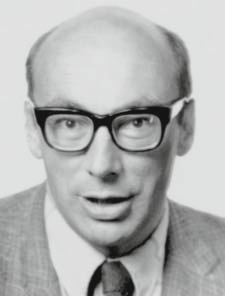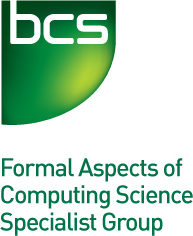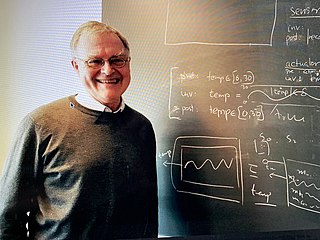Related Research Articles

The Z notation is a formal specification language used for describing and modelling computing systems. It is targeted at the clear specification of computer programs and computer-based systems in general.
In computer science, formal methods are mathematically rigorous techniques for the specification, development, analysis, and verification of software and hardware systems. The use of formal methods for software and hardware design is motivated by the expectation that, as in other engineering disciplines, performing appropriate mathematical analysis can contribute to the reliability and robustness of a design.

Peter John Landin was a British computer scientist. He was one of the first to realise that the lambda calculus could be used to model a programming language, an insight that is essential to the development of both functional programming and denotational semantics.

Jonathan P. Bowen FBCS FRSA is a British computer scientist and an Emeritus Professor at London South Bank University, where he headed the Centre for Applied Formal Methods. Prof. Bowen is also the Chairman of Museophile Limited and has been a Professor of Computer Science at Birmingham City University, Visiting Professor at the Pratt Institute, University of Westminster and King's College London, and a visiting academic at University College London.
The B method is a method of software development based on B, a tool-supported formal method based on an abstract machine notation, used in the development of computer software.

Clifford "Cliff" B. Jones is a British computer scientist, specializing in research into formal methods. He undertook a late DPhil at the Oxford University Computing Laboratory under Tony Hoare, awarded in 1981. Jones' thesis proposed an extension to Hoare logic for handling concurrent programs, rely/guarantee.

Professor Dines Bjørner is a Danish computer scientist.
The Z User Group (ZUG) was established in 1992 to promote use and development of the Z notation, a formal specification language for the description of and reasoning about computer-based systems. It was formally constituted on 14 December 1992 during the ZUM'92 Z User Meeting in London, England.

BCS-FACS is the BCS Formal Aspects of Computing Science Specialist Group.
John S. Fitzgerald FBCS is a British computer scientist. He is a professor at Newcastle University. He was the head of the School of Computing before taking on the role of Dean of Strategic Projects in the university’s Faculty of Science, Agriculture and Engineering. His research interests are in the area of dependable computer systems and formal methods, with a background in the VDM. He is a former Chair of Formal Methods Europe and committee member of BCS-FACS.
The Meta-IV was an early version of the specification language of the Vienna Development Method formal method for the development of computer-based systems.
Michael ("Mike") William Shields, January 20, 1950 - September 24, 2023 (aged 73) was a British computer scientist.
Peter Lucas was an Austrian computer scientist and university professor.
The Message Authenticator Algorithm (MAA) was one of the first cryptographic functions for computing a message authentication code (MAC).

Anders Peter Ravn was a Danish computer scientist.

Sergiy A. Vilkomir was a Ukrainian-born computer scientist.

Hussein S. M. Zedan was a computer scientist of Egyptian descent, mainly based in the United Kingdom.

Kenneth ("Ken") Arthur Robinson was an Australian computer scientist. He has been called "The Father of Formal Methods in Australia".
References
- ↑ Denvir, Tim (1 March 2017). "Fifty Years of Formal Methods in Software Engineering: Personal View". YouTube . BCS-FACS . Retrieved 28 February 2021.
- 1 2 3 Denvir, Tim (2020). "Curriculum Vitae" (PDF).
- ↑ Denvir, Tim; Astarte, Troy (3 December 2020). "Algol 60 @ 60". YouTube . BCS-FACS . Retrieved 28 February 2021.
- ↑ "FACS: Newsletters". BCS . Retrieved 28 February 2021.
- ↑ "Tim Denvir books". Amazon.co.uk . Amazon . Retrieved 28 February 2021.
- ↑ "Tim Denvir". Scottish Mountaineering Club . Retrieved 30 January 2024.